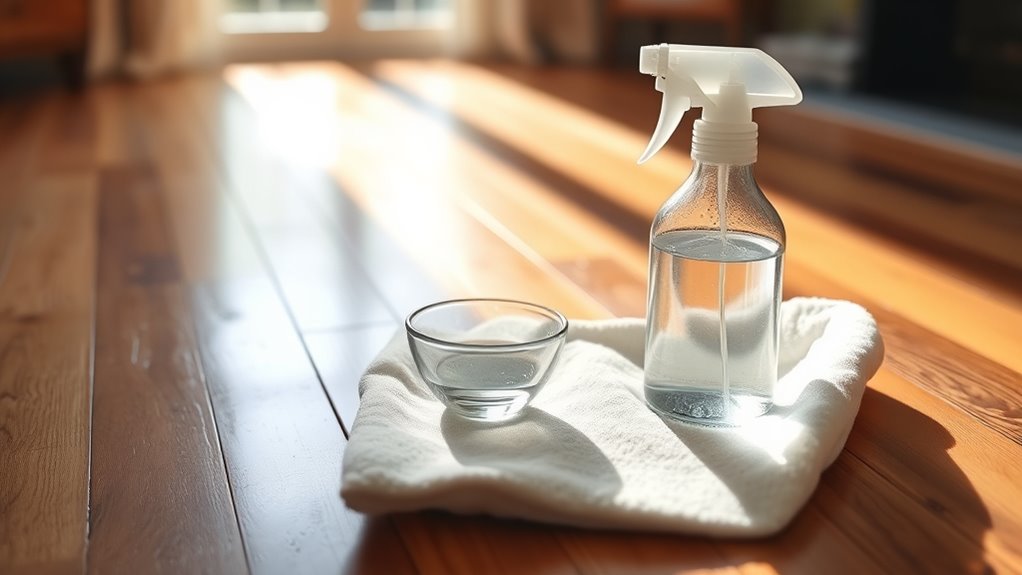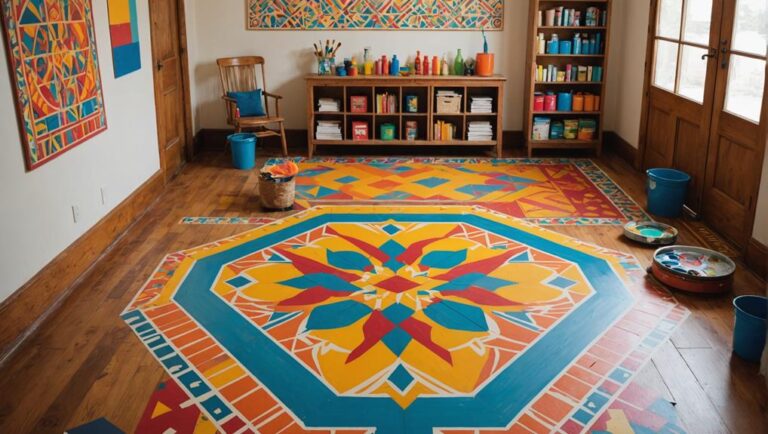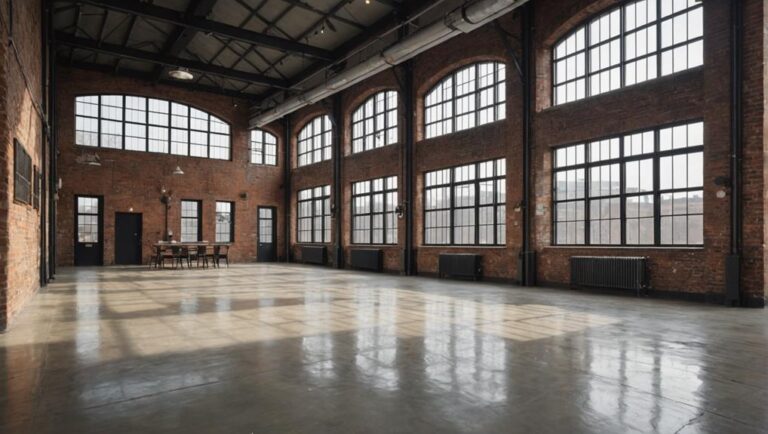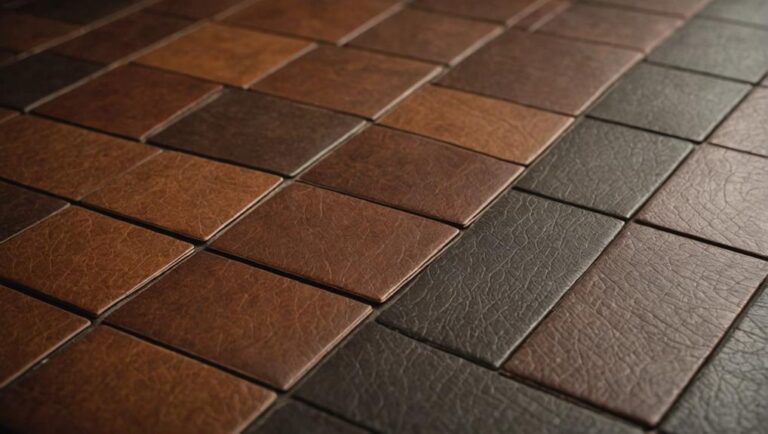To get urine smell out of wood floors, first locate the stain with a UV light to assess its size and depth. Blot fresh spots with an absorbent cloth, then clean the area using a vinegar-water mix to break down uric acid. Follow up with an enzymatic cleaner to remove bacteria and odors deeply. Once dry, seal the floor to prevent lingering smells. If you want to avoid long-term damage and keep your floors fresh, there’s more you should know.
Identifying the Source and Extent of the Urine Stain
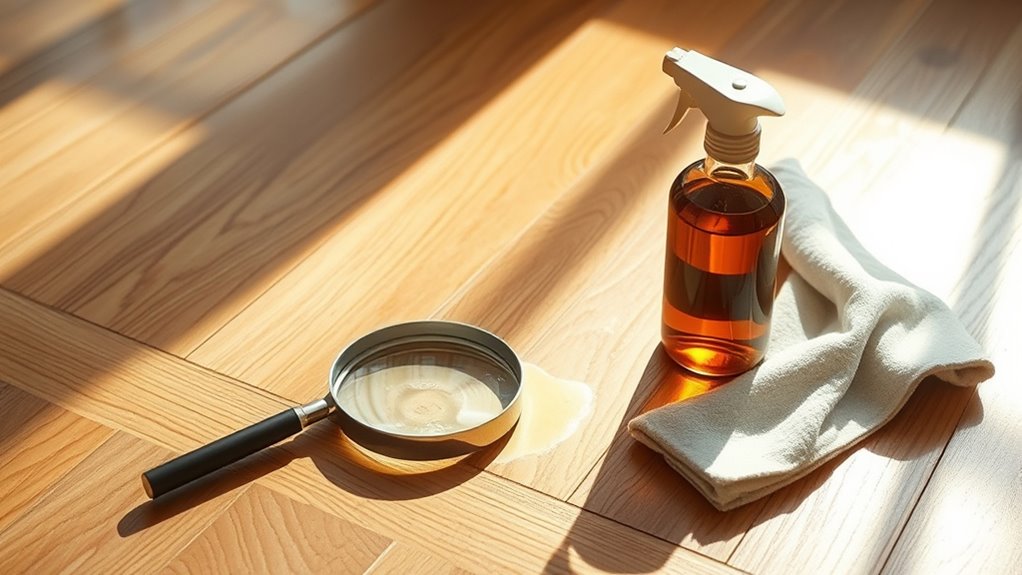
Someone unfamiliar with the problem might overlook the true source of the odor. Effective urine detection is your first step toward reclaiming your space. Use a UV blacklight in a dark room to pinpoint urine stains invisible to the naked eye. This precise urine detection method reveals the affected areas, enabling accurate stain assessment. Once identified, examine the size and depth of the stain on your wood floor. A thorough stain assessment helps determine the treatment intensity required. Keep in mind, urine can seep beneath the surface, so probe gently around the visible stain. By carefully identifying the source and extent of the urine stain, you gain control and freedom to apply targeted cleaning methods, restoring your wood floors without guesswork or wasted effort.
Immediate Cleanup Steps for Fresh Urine Spots
When you spot fresh urine on your wood floor, start by blotting up as much liquid as possible without rubbing. Next, clean the area with a mild detergent diluted in water to break down residues. Finally, dry the spot thoroughly and quickly to prevent moisture damage and lingering odors.
Blot Excess Urine
Start by immediately blotting the urine with a clean, absorbent cloth or paper towel to prevent it from soaking deeper into the wood. Use effective blotting techniques: press firmly without rubbing, as rubbing can spread the urine and embed it further into the grain. Replace the cloth or towel as soon as it becomes saturated to maintain absorbency. Opt for high-quality absorbent materials designed to draw moisture away quickly. Focus on lifting as much liquid as possible in these initial moments—this step is essential for minimizing odor and damage. Avoid using colored or printed cloths that might transfer dyes onto the wood. By acting swiftly and employing proper blotting techniques with the right absorbent materials, you take control of the cleanup, preserving your wood floor’s integrity and preventing lingering urine smells.
Use Mild Detergent
A mild detergent is essential for effectively breaking down urine residues without damaging your wood floor’s finish. You want to choose a detergent that balances cleaning power with gentle ingredients to preserve your floor’s integrity. Avoid harsh chemicals that strip or dull the wood. Mild detergent benefits include safe residue removal and protection of sealants. Common detergent types suitable for this task are biodegradable dish soap and specialized wood cleaners. Dilute the detergent in warm water for best results.
| Detergent Type | Benefits |
|---|---|
| Biodegradable Dish Soap | Gentle, readily available |
| Specialized Wood Cleaner | Formulated for wood, effective |
| Mild All-Purpose Detergent | Safe, versatile |
Using the right detergent lets you clean confidently, maintaining freedom from lingering odors and wood damage.
Dry Thoroughly and Quickly
After applying a mild detergent to break down urine residues, you need to dry the area thoroughly and quickly to prevent odor and damage. Effective drying techniques are essential for moisture control on wood floors. Here’s how to do it right:
- Blot Excess Moisture: Use clean, absorbent towels to blot the spot immediately, absorbing as much liquid as possible without rubbing.
- Use a Fan or Dehumidifier: Position a fan or dehumidifier near the affected area to speed up evaporation and maintain low humidity.
- Avoid Heat Sources: Don’t use direct heat like hair dryers, which can warp wood; instead, rely on air circulation for gentle drying.
Using Natural Remedies to Neutralize Odors
When dealing with urine odors on wood floors, natural remedies offer effective, non-toxic solutions that won’t damage your flooring. Start by applying a vinegar solution—mix equal parts white vinegar and water—to the affected area. This breaks down uric acid crystals and neutralizes odors. After letting it sit for 5-10 minutes, blot the area with a clean cloth. Next, sprinkle baking soda generously over the spot to absorb lingering smells and moisture. Let the baking soda sit for several hours, ideally overnight, before vacuuming it up. These natural agents penetrate the wood’s surface without harsh chemicals, preserving your floor’s integrity while freeing you from stubborn urine odors. By using vinegar solution and baking soda, you tackle the problem safely and confidently, maintaining a fresh, clean environment.
Applying Enzymatic Cleaners for Deep Cleaning
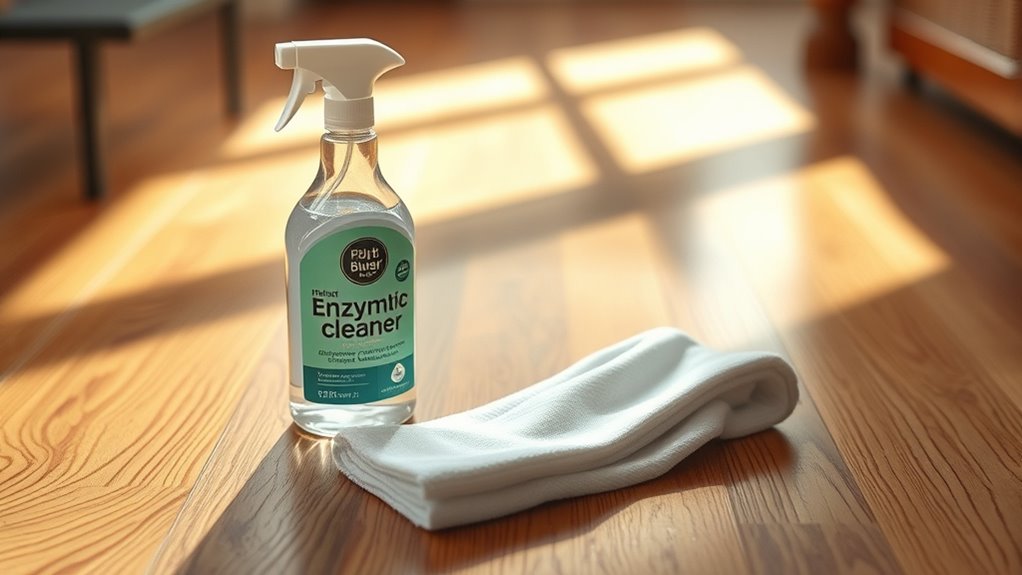
To effectively eliminate urine odors from wood floors, you need enzymatic cleaners that specifically target proteins and bacteria. Choose a product with proven enzyme activity designed for pet stains or organic matter. Apply it thoroughly according to the instructions, ensuring the cleaner penetrates the wood grain for deep cleaning.
Choosing Effective Enzymes
Although many cleaning products claim to remove urine odors, enzymatic cleaners are your best bet for deep cleaning wood floors. Choosing the right enzyme types directly impacts cleaning efficiency and odor elimination. Here’s what to focus on:
- Protease Enzymes – Break down protein-based urine compounds, tackling stains and odors at their source.
- Amylase Enzymes – Target carbohydrate residues often present in urine, enhancing overall cleaning power.
- Urease Enzymes – Convert urea into harmless components, neutralizing the persistent ammonia smell effectively.
Selecting a product combining these enzyme types guarantees you maximize cleaning efficiency without harming your wood floors. Remember, the right enzymes work beneath the surface, liberating you from lingering urine odors for good.
Proper Application Techniques
Apply enzymatic cleaners carefully to make certain they penetrate deeply into the wood grain and break down urine compounds effectively. Start by selecting the right application methods—spraying evenly or using a sponge works best to avoid oversaturation. Use cleaning tools like microfiber cloths or soft-bristle brushes to gently work the cleaner into the wood’s pores without causing damage. Allow the enzymatic solution to sit for the recommended time, typically 10-15 minutes, to maximize its effectiveness. Avoid wiping it off prematurely; instead, let it air dry so enzymes can continue breaking down odor-causing molecules. For stubborn spots, repeat the process using the same precise application methods and cleaning tools. Proper technique makes sure thorough deodorization while preserving your wood floor’s integrity and your freedom from persistent odors.
Preventing Future Urine Odors on Wood Floors
Since wood floors can absorb urine odors quickly, preventing future incidents is crucial for maintaining a fresh environment. You can take these preventive measures to guarantee effective odor prevention:
- Prompt Cleaning: Immediately wipe up any urine spills using an enzymatic cleaner designed for pet stains. This breaks down odor-causing compounds before they seep into the wood.
- Protective Barriers: Apply a high-quality sealant or polyurethane finish to your floors. This creates a waterproof barrier that minimizes absorption and simplifies cleanup.
- Behavioral Training: If pets are involved, consistent training and providing designated bathroom areas reduce accidents and the risk of odors setting in.
When to Call Professional Hardwood Floor Cleaners
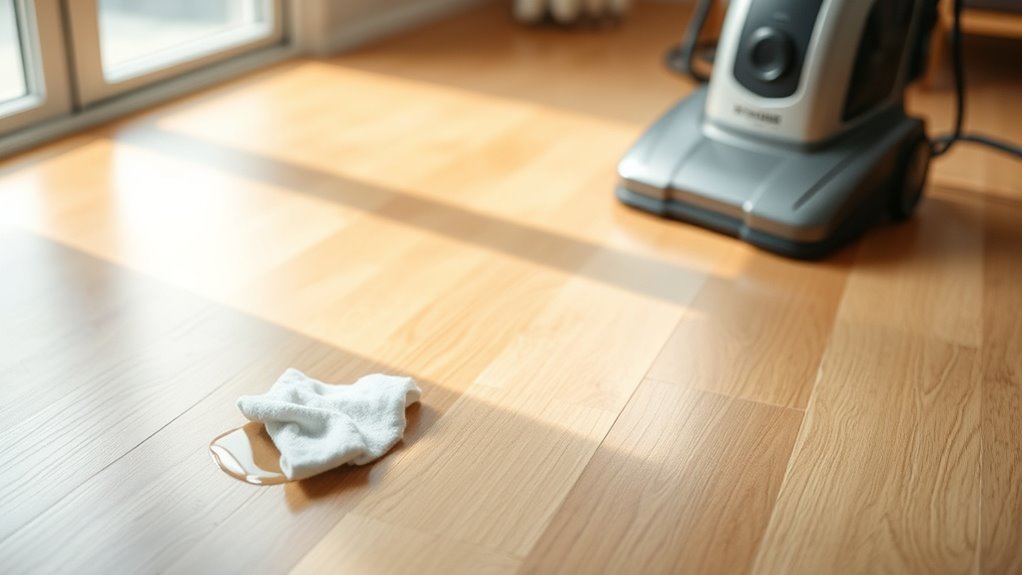
Even with careful preventive steps, urine odors can sometimes persist or worsen, signaling the need for professional hardwood floor cleaning. If you notice a lingering smell despite thorough cleaning or see discoloration and damage to the wood, it’s time to contemplate professional services. Experts have specialized tools and products that penetrate deep into the wood fibers, removing odors and preventing long-term damage. Choosing professional hardwood maintenance guarantees your floors are treated without compromising their finish or integrity. Additionally, if your attempts have caused surface wear or if the urine has soaked through the finish, professionals can assess and restore the floor properly. Don’t wait until the problem worsens—calling in the right experts protects your investment and keeps your home fresh and odor-free.

